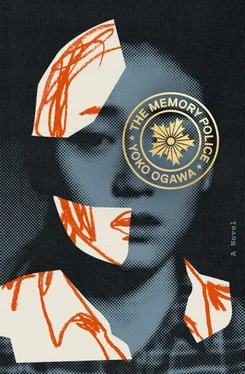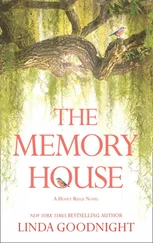Yoko Ogawa
THE MEMORY POLICE
Chapter 1

I sometimes wonder what was disappeared first—among all the things that have vanished from the island.
“Long ago, before you were born, there were many more things here,” my mother used to tell me when I was still a child. “Transparent things, fragrant things… fluttery ones, bright ones… wonderful things you can’t possibly imagine.
“It’s a shame that the people who live here haven’t been able to hold such marvelous things in their hearts and minds, but that’s just the way it is on this island. Things go on disappearing, one by one. It won’t be long now,” she added. “You’ll see for yourself. Something will disappear from your life.”
“Is it scary?” I asked her, suddenly anxious.
“No, don’t worry. It doesn’t hurt, and you won’t even be particularly sad. One morning you’ll simply wake up and it will be over, before you’ve even realized. Lying still, eyes closed, ears pricked, trying to sense the flow of the morning air, you’ll feel that something has changed from the night before, and you’ll know that you’ve lost something, that something has been disappeared from the island.”
My mother would talk like this only when we were in her studio in the basement. It was a large, dusty, rough-floored room, built so close to the river on the north side that you could clearly hear the sound of the current. I would sit on the little stool that was reserved for my use, as my mother, a sculptor, sharpened a chisel or polished a stone with her file and talked on in her quiet voice.
“The island is stirred up after a disappearance. People gather in little groups out in the street to talk about their memories of the thing that’s been lost. There are regrets and a certain sadness, and we try to comfort one another. If it’s a physical object that has been disappeared, we gather the remnants up to burn, or bury, or toss into the river. But no one makes much of a fuss, and it’s over in a few days. Soon enough, things are back to normal, as though nothing has happened, and no one can even recall what it was that disappeared.”
Then she would interrupt her work to lead me back behind the staircase to an old cabinet with rows of small drawers.
“Go ahead, open any one you like.”
I would think about my choice for a moment, studying the rusted oval handles.
I always hesitated, because I knew what sorts of strange and fascinating things were inside. Here in this secret place, my mother kept hidden many of the things that had been disappeared from the island in the past.
When at last I made my choice and opened a drawer, she would smile and place the contents on my outstretched palm.
“This is a kind of fabric called ‘ribbon’ that was disappeared when I was just seven years old. You used it to tie up your hair or decorate a skirt.
“And this was called a ‘bell.’ Give it a shake—it makes a lovely sound.
“Oh, you’ve chosen a good drawer today. That’s called an ‘emerald,’ and it’s the most precious thing I have here. It’s a keepsake from my grandmother. They’re beautiful and terribly valuable, and at one point they were the most highly prized jewels on the island. But their beauty has been forgotten now.
“This one is thin and small, but it’s important. When you had something you wanted to tell someone, you would write it down on a piece of paper and paste this ‘stamp’ on it. Then they would deliver it for you, anywhere at all. But that was a long time ago…”
Ribbon, bell, emerald, stamp. The words that came from my mother’s mouth thrilled me, like the names of little girls from distant countries or new species of plants. As I listened to her talk, it made me happy to imagine a time when all these things had a place here on the island.
Yet that was also rather difficult to do. The objects in my palm seemed to cower there, absolutely still, like little animals in hibernation, sending me no signal at all. They often left me with an uncertain feeling, as though I were trying to make images of the clouds in the sky out of modeling clay. When I stood before the secret drawers, I felt I had to concentrate on each word my mother said.
My favorite story was the one about “perfume,” a clear liquid in a small glass bottle. The first time my mother placed it in my hand, I thought it was some sort of sugar water, and I started to bring it to my mouth.
“No, it’s not to drink,” my mother cried, laughing. “You put just a drop on your neck, like this.” Then she carefully dabbed the bottle behind her ear.
“But why would you do that?” I asked, thoroughly puzzled.
“Perfume is invisible to the eye, but this little bottle nevertheless contains something quite powerful,” she said.
I held it up and studied it.
“When you put it on, it has a wonderful smell. It’s a way of charming someone. When I was young, we would use it before we went out with a boy. Choosing the right scent was as important as choosing the right dress—you wanted the boy to like both. This is the perfume I wore when your father and I were courting. We used to meet at a rose garden on the hill south of town, and I had a terrible time finding a fragrance that wouldn’t be overpowered by the flowers. When the wind rustled my hair, I would give him a look as if to ask whether he’d noticed my perfume.”
My mother was at her most lively when she talked about this small bottle.
“In those days, everyone could smell perfume. Everyone knew how wonderful it was. But no more. It’s not sold anywhere, and no one wants it. It was disappeared the autumn of the year that your father and I were married. We gathered on the banks of the river with our perfume. Then we opened the bottles and poured out their contents, watching the perfume dissolve in the water like some worthless liquid. Some girls held the bottles up to their noses one last time—but the ability to smell the perfume had already faded, along with all memory of what it had meant. The river reeked for two or three days afterward, and some fish died. But no one seemed to notice. You see, the very idea of ‘perfume’ had been disappeared from their heads.”
She looked sad as she finished speaking. Then she gathered me up on her lap and let me smell the perfume on her neck.
“Well?” she said.
But I had no idea what to answer. I could tell that there was some sort of scent there—like the smell of toasting bread or the chlorine from a swimming pool, yet different—but no matter how I tried, no other thought came to mind.
My mother waited, but when I said nothing she sighed quietly.
“It doesn’t matter,” she said. “To you, this is no more than a few drops of water. But it can’t be helped. It’s all but impossible to recall the things we’ve lost on the island once they’re gone.” And with that, she returned the bottle to its drawer.
When the clock on the pillar in her studio struck nine, I went up to my room to sleep. My mother returned to work with her hammer and chisel, as the crescent moon shone in the large window.
As she kissed me good night, I finally asked the question that had been bothering me for some time.
“Mama, why do you remember all the things that have been disappeared? Why can you still smell the ‘perfume’ that everyone else has forgotten?”
She looked out through the window for a moment, gazing at the moon, and then brushed some stone dust from her apron.
Читать дальше














